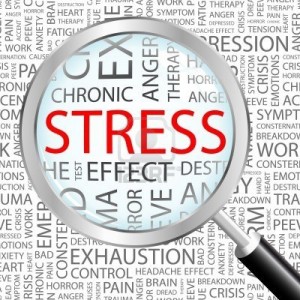Whether or not September marks a return to the classroom for you or your kids, autumn typically brings about abrupt changes in routines and workloads, resulting in more stress and less of the natural mood-boosting vitamin D we all enjoyed from being outdoors during summer. While stress itself can’t always be avoided, here is how establishing a solid stress relief strategy can go a long way in helping you cope and recover from the toll that stress takes on your body, mind, and spirit.
How Stress Wreaks Havoc
Have you ever noticed that during times of stress, your posture changes, your skin looks duller, your muscles feel tight, and your body feels heavier and more sluggish?
Long periods of stress can lead to chronic muscle tension that in turn can trigger headache and migraine pain, joint pain, nerve pain, bruxism (nocturnal teeth grinding), and aggravate pre-existing conditions and past injuries.
The hormonal cascade that stress triggers affects blood pressure, circulation, breathing rate, muscle tension and creates emotional anxiousness and agitation. Worse yet, chronic stress can cause potentially serious disruptions throughout the body, including a lowered immunity and a heightened risk of heart attack, stroke, autoimmune flare-ups, cognitive, reproductive, weight, and digestive issues. For these reasons, it’s wise to take stress seriously and establish a healthy stress relief strategy to help mitigate its adverse effects.
Mitigating the Harmful Effects of Stress
While periods of stress are nearly impossible to avoid, there are things you can do to help mitigate its adverse effects on our mind and body, including:
- Exercise: physical movement, done in moderation, can uplift mood and mitigate the detrimental effects of chronic stress. You can double up on the positive effects of exercise by getting outdoors and asking a friend to join you.
- Meditation, breathing exercise, or prayer: stillness, breathwork, prayer, and self-reflection can restore calmness and help you focus on the things you can do that are within your control.
- Time with pets and friends: even though stress can make you want to withdrawal from social obligations, making time to talk or visit with a trusted friend can go a long way in making you feel optimistic and supported.
- Addressing root causes of stress: sometimes, what triggers stress is evident and temporary. Other times, stress is the result of lifestyle choices requiring change. Toxic workplaces, being burdened with other people’s conflicts, and being overtaxed with too many obligations can all lead to physical and emotional burnout. Stress will become chronic unless and until the root causes are adequately addressed.
- Simplifying your schedule: It’s tempting to take things on while feeling overly optimistic about our time and energy reserves, but having too many obligations and–even enjoyable activities–scheduled can leave you feeling stretched and strained. When in doubt, schedule less and leave more time for spontaneity and quiet time as needed.
- Self-care: often the first thing to be pushed aside when stressed, self-care is vital, even if it’s just making time for an afternoon nap or a relaxing bath with your favourite essential oils and soft lighting. The key is to pay attention to the signs your body sends you that rest is needed.
- Stress relief treatments: lingering pain and tension induced by stress often require therapeutic treatments to resolve, such as massage therapy, acupuncture, physiotherapy, and chiropractic treatments.
When Stress Relief Treatments Are Needed
Sometimes, therapeutic intervention is warranted after repeated bouts or long periods of stress, especially when considering how stress-induced tension and inflammation can aggravate pre-existing conditions and old injuries or cause new ones. Postural imbalances, nerve pain, tension headaches, neck and shoulder pain, TMJ disorders, sleep disturbances, chronic muscle tension, and circulation issues are some of the most common physical manifestations of stress that professionally administered stress relief treatments can remedy.
Therapeutic stress relief treatments can address the compounding effects of stress via several unique approaches. For example:
Acupuncture is a natural and effective way of bringing stress-induced hormones back into balance, restoring a much-needed sense of calm.
When stress contributes to misalignment and aggravation of pre-existing conditions or past injuries, tailored chiropractic care and physiotherapy treatments can work wonders restoring strength, mobility, muscular balance, and optimal alignment while helping alleviate nerve and joint pain.
For stress-induced muscle tightness and circulation concerns, scheduling a registered massage therapy treatment will effectively release tension and immediately increase oxygen and nutrient-rich blood flow to the areas treated.
The positive effects that physiotherapy, chiropractic care, acupuncture, and therapeutic massage have on improving oxygen-rich circulation also helps aid the body’s natural healing and detoxification process by increasing the movement of lymphatic fluid via massage and myofascial release. The combined benefits of releasing muscle and fascia tension and improving circulation and lymphatic flow explain why people typically feel lighter and even notice a nice glow to their skin following stress relief treatments such as massage therapy and acupuncture.
Regardless of which stress relief treatments you receive, the healing benefits of addressing stress-related tension are both an act of self-care and an investment in your health and wellbeing.
Book a Therapeutic Stress Relief Treatment Today
Experience the healing, calming, and restorative benefits of a therapeutic stress relief treatment. Give our team of practitioners at Diversified Health Clinic a call today at (250) 382-0018 or book an appointment online.
Related
WHAT TO DO WHEN HOLIDAY STRESS TAKES THE JINGLE OUT OF YOUR JANGLE
NERVE PAIN WITH SCIATICA: WHAT IT IS AND HOW WE APPROACH SCIATIC TREATMENT IN VICTORIA BC




